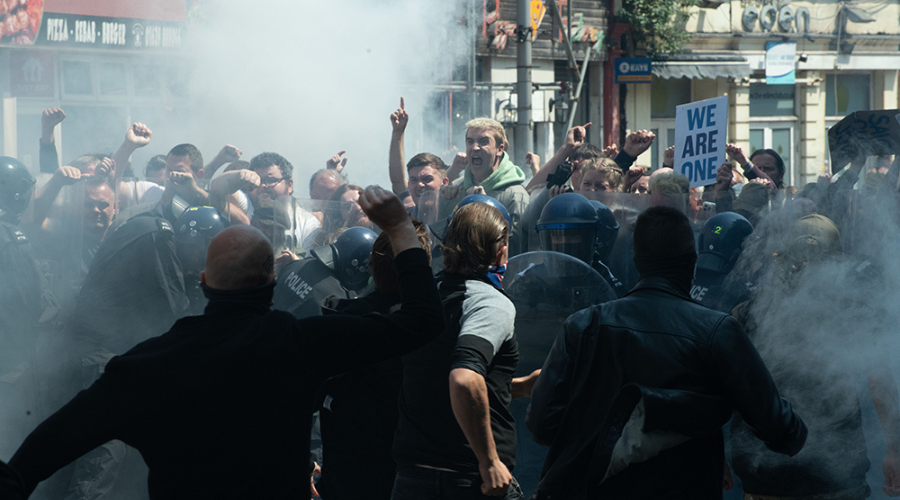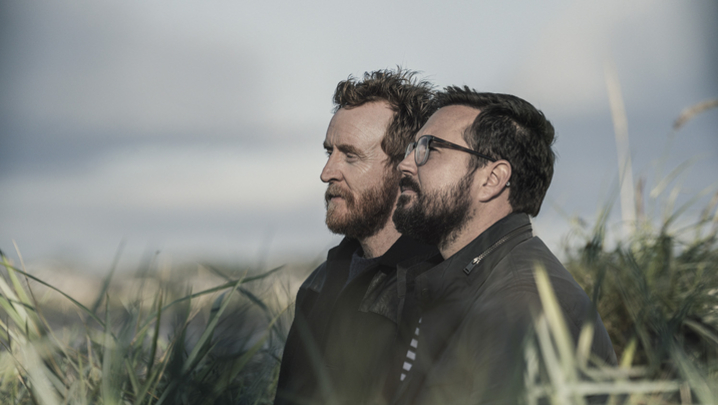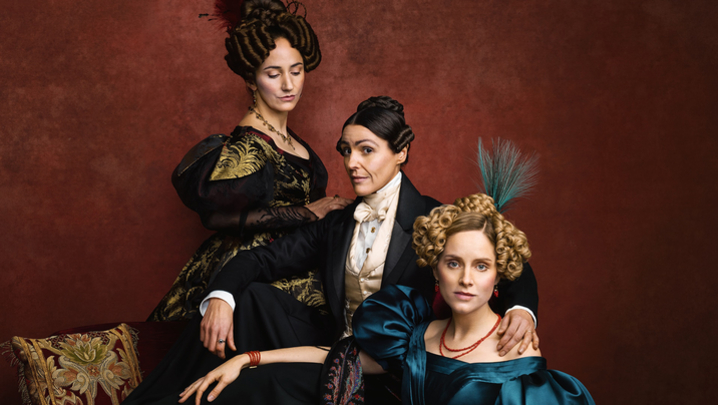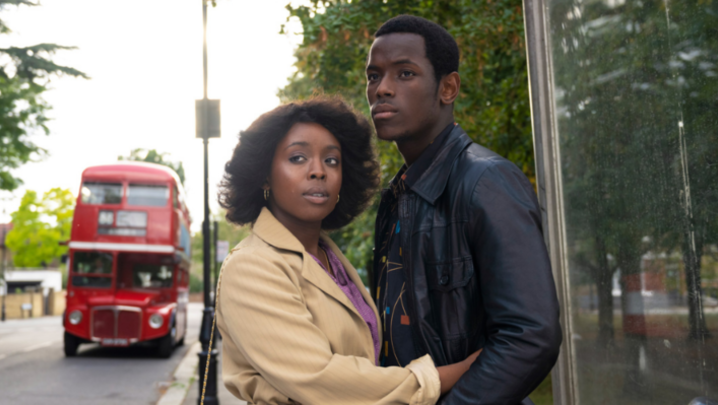Matthew Bell travels to Port Talbot, where the creators of The Way reveal how they developed a series that imagines Wales engulfed by revolution
Wales is in flames after a strike at the Port Talbot steelworks spirals out of control, forcing the Driscoll family to flee their home and country. Such is the premise of The Way, by turns doggedly realistic and fantastical, but always highly watchable.
The ambitious three-part BBC One drama, which imagines a civil uprising in Wales, is written by James Graham and marks Michael Sheen’s debut as a TV director. And, unusually, has the creative input of the iconoclastic documentary film-maker Adam Curtis.
Both Sheen and Graham – as well as cast, crew and many of local boy Sheen’s friends and family – were in the audience for an RTS Cymru Wales screening of the first episode last month.
“Tonight, sitting here in this place with these people, was incredibly emotional,” said Sheen, speaking after the premiere.
Sheen first approached Bethan Jones, the producer of Sherlock and film-poem Aberfan: The Green Hollow, in 2017 with the bare bones of an idea: “A British family being uprooted and having to flee their home. They go on this journey through Britain and then eventually cross the channel.”
Finding a reason for the family’s flight took the actor to Curtis. Over the past three decades his hallucinatory, and sometimes disturbing, TV series have dissected subjects as diverse as individualism, Islamism, modern culture and Putin’s Russia.
“I was a huge fan of his documentaries and the ideas about where power really lies and what’s going on under the skin of society and culture,” said Sheen. “I thought he would be really interesting to talk to.”
Sheen was so taken with Curtis that he convinced the film-maker to come on board as co-creator and executive producer. The duo discussed writers and came up with James Graham. At the time, the prolific Graham was then best known for his National Theatre play The House – which examined the turbulent politics of 1970s Britain – and the RTS Award-winning Channel 4 film Coalition, which looked at the formation of the Tory-Lib Dem Government in 2010.
Sheen continued: “At that point, I didn’t know James but I knew [that he was a writer who] was brilliant at doing big issues, state of the nation stuff, but all through the prism of real people [told] with warmth and humanity, bringing the everyday and the extraordinary together. We knew that was what we wanted to try and do in this piece.”
Sheen, Curtis and Graham began work on developing The Way, by which time Sheen found himself working with the writer on another project – the ITV version of Graham’s play Quiz about the “Coughing Major” who cheated his way to the jackpot on Who Wants to Be a Millionaire?
“I always remember talking to you about [The Way] while you were dressed in your Chris Tarrant wig, which was extra-surreal,” recalled Graham.
It was only at this point that the three decided to set the series in Port Talbot. Sheen recalled Curtis saying that the story needed to be believable, which is why industrial action at the town’s steel works was chosen as the drama’s flashpoint.
The announcement in January of huge job losses at the steel works, which has led to fury and despair in the town, suggests that The Way’s premise is far from implausible.
Graham hails from Nottinghamshire, not South Wales but, as he pointed out, both areas have a shared industrial legacy in coal and the 1984 miners’ strike. Indeed, Graham’s superlative BBC series Sherwood examined how communities were polarised by the strike.
The “very simple question”, The Way poses, continued Graham, is: “Could it happen here?
“We always think of… uprisings [and] the collapse of a state as being impossible in Britain because we’re so boring and so stable; we’re supposedly the oldest surviving democracy on Earth.
“It was very exciting for me to war game what circumstances would [lead] to the collapse of a country like Wales and a migration crisis that would come out of that, where the Welsh would become refugees in Britain.”
This story is told through the lens of the Driscoll family. “We always knew that the emotional core of the drama would be… an ordinary family that would go on an extraordinary journey,” explained Graham.
Graham, though, found that reality had a habit of intruding while he was penning the script. “I kept writing drafts and the world kept overtaking us,” he recalled.
The script imagined a lockdown with people confined to their houses and then, during the Covid pandemic, this actually happened: “We had to upscale the chaos.”
The pandemic gave Graham and his co-creators – helped by numerous Zoom conversations – time to develop the script: “Fundamentally, though, the pandemic… reminded everyone that history isn’t over…. We used to talk about, at the turn of the Millennium, the idea of the end of history, that everything that could possibly happen had happened.”
Covid, he said, was a stark reminder “that something can just shift unpredictably without any warning”.
The Way received its premiere in Port Talbot on 2 February. The RTS Cymru Wales event was produced by Edward Russell. The Way was made by Welsh indie Red Seam, in association with Little Door Productions. It began on BBC One on 19 February and is available on BBC iPlayer.
Filming in Port Talbot
The cast of The Way is a who’s who of Welsh actors, even director Michael Sheen has a small role.
Callum Scott Howells, who won an RTS Actor award for his debut TV role playing Colin in Russell T Davies’s Aids drama It’s a Sin, is the Driscoll family’s delinquent son, Owen.
The Rhondda-born actor felt at home on set. ‘I got to learn about Port Talbot and its history. One of the big things for me was filming in Pontrhydyfen, where Richard Burton grew up,’ he said. ‘I learned so much filming here. I feel very lucky and I will always look back on this time with such gratitude.’
Sheen forms a local acting trinity with Burton and Anthony Hopkins – all three actors hail from the Port Talbot area. Howells said he had ‘grown up watching Michael’, adding that his favourite film was The Damned United, in which Sheen plays Brian Clough.
So, how was it, being directed by one of your heroes? ‘It was terrifying, but Michael made me feel comfortable, and free and able to express myself in front of the camera. He’s not precious; he really aids performances.’
Owen’s formidable mother, Dee, is played by Cardiff-born Mali Harries (Hinterland): ‘I knew who [Dee] was – she’s my mum, she’s my gran, she’s my great gran, she’s a strong Welsh woman who has faced trauma and had a hard life.’
‘The script was extraordinary,’ continued Harries. ‘There’s definite fire in [Dee] – that fire is something that I enjoyed releasing, that fight in us. It made me realise how powerful people can be… if we stand together, we can make a noise and make a difference.’
On filming in and around Port Talbot, executive producer Bethan Jones added: ‘There’s a wealth of talent here and amazing locations… you’ve got everything that you might need within a 45km radius. It was a real privilege to be able to work here and to get to know and work with the community.’






